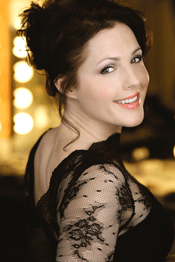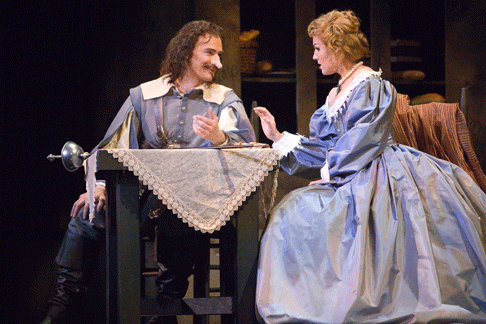22 Apr 2011
Cyrano, Florida Grand Opera
To enter into David DiChiera’s space as he talks opera shop is to risk being pulled into his world, rapt by a tractor beam emitting a constant flow of music theater load.

To enter into David DiChiera’s space as he talks opera shop is to risk being pulled into his world, rapt by a tractor beam emitting a constant flow of music theater load.
A ready smile that often gives way to laughter, a simple though intense curiosity, an ease in interrelating, all superimposed over a seriousness of purpose — these are David DiChiera’s communication arsenal. It could be said that these selfsame traits reside within one Cyrano De Bergerac, the uber-nosed gentleman swordsman of France and the protagonist in DiChiera’s opera. It could also be said that parts of Cyrano’s character reside within us all.
Side by side in the rehearsal hall inside the Adrienne Arsht Performing Arts Center in Miami sit DiChiera, stage director Bernard Uzan, and conductor Mark D. Flint. It is the second shift of rehearsals for the day of the scene that leads into Cyrano’s quintet. Florida Grand Opera’s production of the composer’s Cyrano opens here on April 23. Marian Pop, Leah Hunt Partridge, Sebastian Gueze, Peter Volpe and Aaron St. Clair Nicholson are present. In the relaxed atmosphere, Uzan and singers are at work hashing out scene details as Dr. DiChiera — whose other titles include music scholar, impresario, and community-activist — follows along in the score.
“It began with Bernard. He was music director in Detroit.” DiChiera returns to when his Cyrano first took shape. “I think your music would be wonderful for my favorite story.” Hearing DiChiera tell this story is to get a glimpse into how Cyrano charmed him; it would not be long before Cyrano’s story would become a favorite of DiChiera’s. “Cyrano is one of the greatest works. In France, it is like a work of Shakespeare. That was something to overcome and the credit for that goes to Bernard. He distilled that.”
 Marian Pop [Photo courtesy Uzan Division/Pinnacle Arts Management, Inc.]
Marian Pop [Photo courtesy Uzan Division/Pinnacle Arts Management, Inc.]
A major factor that makes Edmond Rostand’s creative design for Cyrano lastingly relevant, such that numerous incarnations of it appear in the arts and popular culture, is its characters. DiChiera is drawn to the “duality” of Cyrano the man. “Outside, he is a fighter, a poet, a musician. Internally, he has many other talents that are latent. He keeps these hidden because he feels that if he can’t really experience love himself…,” here DiChiera stops, gropes, and gives up, as if to let the rest resolve on its own. Cyrano again, in a sense, is all of us. Who is absolutely satisfied with their physical appearance? Whose heart does not smart from the memory of unrequited love?
“He’s brave,” Romanian baritone Marian Pop, the only Cyrano DiChiera’s version has known, enters with eyes wide open. He points out as an example Cyrano’s plowing into hostile territory, against insurmountable odds, in defense of his friend Ligniere. Then there is the nose. “Without his nose, without physical deformity, we don’t have the story.” Pop mixes in another interesting facet to Cyrano. “He only talks about IT with those that are close to him. Everyone else is silent about it.” The singer strikes a face of fear, acting out how others might feel in the presence of Cyrano’s tremendous olfactory agent. “If you are lucky, you are born with a [real] handicap,” Bernard Uzan adds philosophically. “Cyrano sees things differently. Everything for him has a different meaning. He does everything 100%, for a while.”
 Leah Partridge [Photo courtesy Kristin Hoebermann]
Leah Partridge [Photo courtesy Kristin Hoebermann]
Roxane is interesting to DiChiera because “she evolves; her music evolves too. She goes from a dame precieuse to a mature person. Not everyone matures.” In 17th century France, groups of educated and articulate high society women gathered in the salon Chambre bleue for what developed into discourses on love (the derivation of the romance novel?) and a training ground for verbal thrusts and parries. These women came to be known les precieuse, not a moniker meant to flatter.
Here again, DiChiera finds another scenario many can relate to through the young Roxane: beauty, and even formally acquired intelligence, does not turn out inner beauty. That is a whole other set of qualities. It would seem that most everyone is familiar with the properties of “temporary beauty” (thank you Graham Parker). We are introduced to this Roxane, the dame precieuse, early in the story. She is preoccupied with physical appearance. Soprano Leah Hunt Partridge, DiChiera’s first Roxane, calls her “a dreamer, an idealist.” Her transformation begins to take critical shape when she digs deep into what she thinks are letters written by Christian.
 Sebastien Gueze [Photo by Lucile Leber]
Sebastien Gueze [Photo by Lucile Leber]
Roxane comes into her own when her heart feels “these letters, the emotion of the letters,” DiChiera wrenches. Her worldview crystallizes as she comes to terms with what has happened — the writing is searching for, and intimate to, her; this can only be love. The author of these letters wrote with a profound personal love for Roxane. Towards the end, she recognizes Cyrano’s voice in the writing. It is he that feels these words, yet he was willing to sacrifice himself (protecting Christian as Roxane asked and speaking for her young suitor in the letters) for her sake; this is love.
DiChiera speaks of Christian as if he were a darling son, je jeune but wholly honorable. “In Christian’s aria, he is monologuing with himself. He reaches a point when he realizes he has to let her [Roxane] go.” At this point, Roxane has told Christian how she feels about the letters. Christian, in his inner wrestling, feels how moved Roxane is; crestfallen though he is, Christian understands what must be done. Rostand’s story makes it possible for “people to take, and identify with, things differently,” as DiChiera states. “For me, Christian is not stupid like we like to say, he is just losing his words in front of her, the idea was from Cyrano,” this from Sebastian Gueze, performing Christian and for the first time with FGO.
Music, and opera particularly, can facilitate the empathy and varying interpretations DiChiera and Gueze speak of: “Listen to how the music goes inside. I’m an opera-lover. Music can express what words cannot express.” At best, where a segment of a story is better served by reconfiguring it through one of music’s conventions, poetry and music melt into one, an “operatic” moment. The ensemble is such a convention.
 Les cousin: Cyrano (Marian Pop) and Roxane (Leah Partrigde) [Photo by John Grigaitis]
Les cousin: Cyrano (Marian Pop) and Roxane (Leah Partrigde) [Photo by John Grigaitis]
In Act II of Rostand’s play, a host of characters intersect back and forth before the wedding ceremony — each plays an important role with an equally important message to relay. Such a scene may not translate well operatically; there are issues of time and character development to take into account. “I added the idea of the quintet. That is what opera can do,” DiChiera says matter-of-factly about a construction that can be musically and textually (involving Uzan) complicated. The moment in the opera is basically the same. The set of characters meet in a balcony, their comments are similar; the music takes loosely related text, and fuses and condenses the whole into one number.
The primary cast for Cyrano is rounded out with Le Bret and Count de Guiche. In Le Bret, Cyrano has a confidant and admirer who tells it like it is. The Le Bret in this production, baritone Aaron St. Clair Nicholson, says this of Le Bret, “His strengths are in his loyalty and determination.” “Cyrano does not achieve his full potential but dies only after confiding what Le Bret encouraged him to years before.” The wealthy and influential Count de Guiche is the story’s foil: he wants to possess Roxane as she finds ways to ward him off. Bass Peter Volpe, making his FGO debut as the Count finds an interesting character triangulation, “the specific difference between him, Cyrano and Christian for me is, de Guiche simply lusts after her and the other two are genuinely in love.”
There is another, symbolic element to Cyrano that relates to how our souls are touched by shared humanity, things that reside within us all. It is present in the juxtaposition of Cyrano and Christian as alter egos. Gueze captures this eloquently, “the audience understands before the protagonists that one of them must disappear and die for the other one!” Even though we know how the story ends, this is what has us return to Cyrano time and again in whatever form is conceived to tell his story. The Cyrano in all of us is invited to rise and, if only for a moment, we find ourselves in him. All characters are welcome.
Robert Carreras